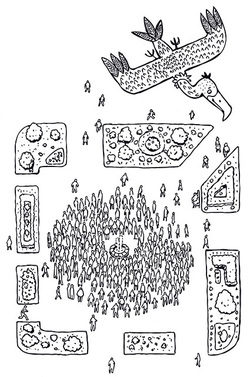
This is a method for initiating a meeting place for citizens, local organisations and politicians. The aim is to discuss and have a dialogue on important issues and to answer the locals’ questions.
This method could constitute an on-going collaboration with the local community, and the discussion/dialogue is focused on issues of special interest to the local area. The number of open area meetings may vary, from every second month or once a quarter to twice a year. The meetings take place in the evening, and are led by local politicians with officials assisting in factual matters, methods, etc. The agenda of the meeting is broadly drawn and informed on before invitations to the meeting are made. To assure that a participant will be answered at the meeting, questions or viewpoints should be registered beforehand. There should also be time for a few additional questions from the participants. A summary of the results is reported back to the participants, either on an individual basis or in an information/newsletter that is sent out after each meeting. Normally it is also available on the web. The summary is also communicated inwards in the organisation, boards as well as administrations. In Lund City, citizen assemblies are performed regularly. The citizen assemblies cannot decide that things will be carried out; they can just make recommendations or propositions. The meeting protocol is signed by the chairperson and two selected citizens. The protocols are subsequently posted in citizen bureaux and libraries. The protocols will also be presented to the city council. It is important to make the agenda and invitation early on, and to inform on the meeting in various ways. Resource expenses are relatively low. Often the meetings take place in in-house premises, and the main costs are for personnel, including time for planning and participation in the meeting, and answering for notes/protocol reaching the participants.
This method could constitute an on-going collaboration with the local community, and the discussion/dialogue is focused on issues of special interest to the local area. The number of open area meetings may vary, from every second month or once a quarter to twice a year. The meetings take place in the evening, and are led by local politicians with officials assisting in factual matters, methods, etc. The agenda of the meeting is broadly drawn and informed on before invitations to the meeting are made. To assure that a participant will be answered at the meeting, questions or viewpoints should be registered beforehand. There should also be time for a few additional questions from the participants. A summary of the results is reported back to the participants, either on an individual basis or in an information/newsletter that is sent out after each meeting. Normally it is also available on the web. The summary is also communicated inwards in the organisation, boards as well as administrations. In Lund City, citizen assemblies are performed regularly. The citizen assemblies cannot decide that things will be carried out; they can just make recommendations or propositions. The meeting protocol is signed by the chairperson and two selected citizens. The protocols are subsequently posted in citizen bureaux and libraries. The protocols will also be presented to the city council. It is important to make the agenda and invitation early on, and to inform on the meeting in various ways. Resource expenses are relatively low. Often the meetings take place in in-house premises, and the main costs are for personnel, including time for planning and participation in the meeting, and answering for notes/protocol reaching the participants.
 RSS Feed
RSS Feed
